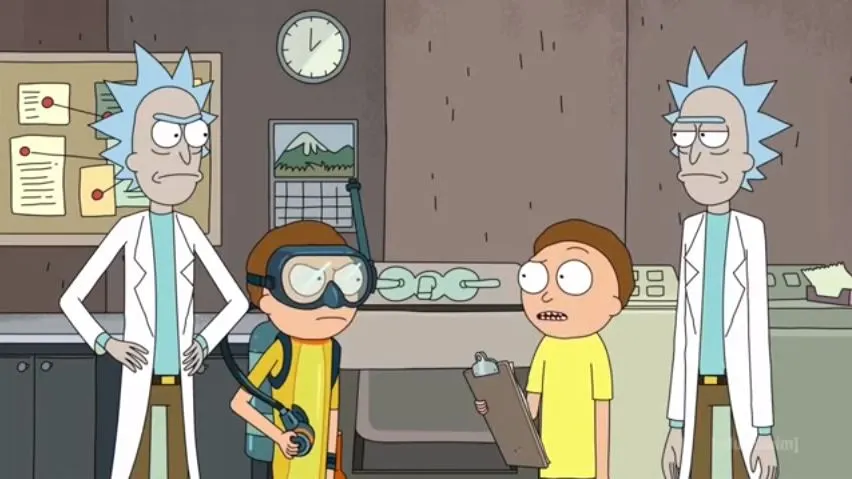The Recap: While our Rick and Morty take a self-contained adventure to Atlantis, the first democratic election is being held on the Citadel of Ricks. The lone Morty candidate makes waves, a by-the-books Rick cop tracks down a Morty crime ring, and a group of delinquent Mortys go looking for a “wishing portal.” Bodies portal up, and a familiar face resurfaces.
Every gathering of R&M since 2013 has, at some point, come around to the subject of Eyepatch Morty. He’s the show’s equivalent of Bill Cipher or Rose Quartz—the generator of a million theories, wisely held back by the writers for moments of maximum punch. Reintroducing him now is the perfect way to force the issue of our Morty’s increased instability and keep things from reverting to the status quo.
The elements around Eyepatch Morty’s plot run a continuum of quality, though none are actively bad. It’s tempting to call the delinquent Mortys the weakest element because it winds up serving as something of an anti-climax, but it’s also vague enough that we could be hearing from that experimental dramatic Morty several seasons from now. Even if that’s the case, it’s a setup at best with elements of and 80s boy-bonding movies, a sequel hook that shows us the dissatisfaction of the Morty population but isn’t strong enough to need a complete subplot. Though in fairness, it did leave me hoping we haven’t seen the last of them. The factory Rick is likewise a story of dissatisfaction ending in a dead end, and the two are stronger as a thematic unit than either alone.
The cop subplot is likewise more a mood piece than anything, an illustration of the pro-union versus self-serving Ricks and Mortys, and despite being a pretty by-the-numbers genre pastiche the moments between the two cops mostly work. There’s something that feels ever-so-slightly in bad taste about using Mortys as stand-ins for a typical cop movie trope of inner city violence and “Morty-on-Morty” crime, given the amount of police brutality against Black Americans, but the subplot is slight enough to keep one from having to linger too long on it.
The political drama is naturally the strongest piece—it has to set up the thematic thruline that ties the other anecdotes together and sell us on the reveal at the end. Roiland sells the gravitas and magnetism of Eyepatch Morty well—it’s easy to forget that this is a character we know very little about, beyond what could be extrapolated through the Rick he was controlling. Given the opportunity to start from not-quite-scratch, we’re presented with a character who is inscrutable on a larger scale but understandable in the moment. He’s a chameleon and, by his admission, a believer in action. It’s a fantastic setup, effectively deploying the return of the now-infamous “For the Damaged” backing track without feeling forced. Presumably things will come to a head in the season finale (with a name like “The Rickchurian Mortydate,” how could it not?).
This jumble of highs and lows is characteristic of Ryan Ridley, writing his first episode this season. Ridley’s been around since the show’s first season, and did in fact write “Close Rickcounters,” the introduction of the Citadel and Eyepatch Morty. Two of his season 1 credits also include two of that season’s three attempted rape subplots (one of which is treated with an appropriate amount of gravitas and horror, one of which has a whiff of “ewww, an unattractive woman!”), and he helmed “Auto Erotic Assimilation,” which helped explode the show’s popularity in season 2.
His episodes feature creative, slick high-concept moments and go to the show’s darkest places, but also have an uneven hit record around sensitive issues. His scripts also delved more than most into glimpsing Rick’s affection for Morty. It remains to be seen how that will mesh with this season’s dedication to scraping the sugar coating off Rick’s image (it’s downright jarring to watch “Close Rickcounters” with this season fresh in one’s mind). While writing credits for the finale haven’t been announced, I would assume he’ll at least be cowriting it.
It’s not unfair to call this episode a little bit fanservicey, focusing on a question viewers have always wondered about (life on the Citadel) and bringing back a beloved character. But it does it well, in a way that feels earned. And if the individual bits sometimes feel uneven the whole is stronger than its parts, weaving the threads together cohesively and ending on a satisfying punch. I’ll be looking forward to what the rest of the season has to offer.
Vrai is a queer author and pop culture blogger; they’re not emotionally prepared for this. You can read more essays and find out about their fiction at Fashionable Tinfoil Accessories, listen to them podcasting on Soundcloud, support their work via Patreon or PayPal, or remind them of the existence of Tweets.
Want more stories like this? Become a subscriber and support the site!
—The Mary Sue has a strict comment policy that forbids, but is not limited to, personal insults toward anyone, hate speech, and trolling.—









Published: Sep 11, 2017 11:02 am